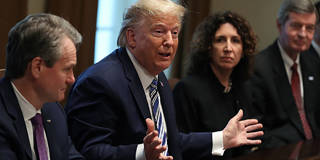As long as US President Donald Trump remains in office, it is difficult to envisage any credible international effort to resolve the financial crisis caused by the COVID-19 pandemic. As a result, there is now every reason to expect a long and severe global recession.
WASHINGTON, DC – On Monday, February 24, with stock markets close to all-time highs, the world was suddenly thrown into a financial crisis as a result of the COVID-19 pandemic. And ever since, international leaders have been making the worst of a bad situation. On March 6, Russia and Saudi Arabia started an oil-price war, which shook global markets further. And US President Donald Trump’s televised address on March 11, in which he announced a suspension of most travel from Europe to the United States, brought the crisis to an entirely new height and plunged financial markets into unmitigated panic.

WASHINGTON, DC – On Monday, February 24, with stock markets close to all-time highs, the world was suddenly thrown into a financial crisis as a result of the COVID-19 pandemic. And ever since, international leaders have been making the worst of a bad situation. On March 6, Russia and Saudi Arabia started an oil-price war, which shook global markets further. And US President Donald Trump’s televised address on March 11, in which he announced a suspension of most travel from Europe to the United States, brought the crisis to an entirely new height and plunged financial markets into unmitigated panic.